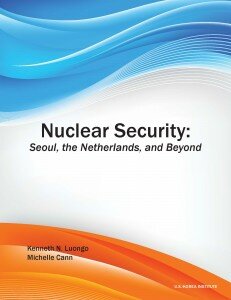 The scope of the Nuclear Security Summit (NSS) has evolved since the process was initiated in 2010. The NSS originally focused only on fissile materials, but now also addresses radioactive source security and the safety and security interface at nuclear facilities. Many consider nuclear security a vital foundation of the global nuclear regime, but it has not been as prominent a discipline as nonproliferation or nuclear safety. However, progress on nuclear disarmament, nonproliferation, and peaceful use are predicated on adequate security structures keeping the material and related equipment protected. In this way, nuclear security underpins, but is separate from, the Nuclear Non-Proliferation Treaty (NPT) and its politics related to nuclear weapons “haves” and “have nots.”
The scope of the Nuclear Security Summit (NSS) has evolved since the process was initiated in 2010. The NSS originally focused only on fissile materials, but now also addresses radioactive source security and the safety and security interface at nuclear facilities. Many consider nuclear security a vital foundation of the global nuclear regime, but it has not been as prominent a discipline as nonproliferation or nuclear safety. However, progress on nuclear disarmament, nonproliferation, and peaceful use are predicated on adequate security structures keeping the material and related equipment protected. In this way, nuclear security underpins, but is separate from, the Nuclear Non-Proliferation Treaty (NPT) and its politics related to nuclear weapons “haves” and “have nots.”
This report is based on discussions from a workshop titled, “Nuclear Security: Seoul, the Netherlands and Beyond,” held in September 2012 in London, UK. The workshop was sponsored by the U.S.-Korea Institute at SAIS, the Partnership for Global Security, and the International Institute for Strategic Studies as part of an ongoing dialogue on nuclear security governance.
The report draws on major strands of the discussions put forward at that workshop and provides recommendations in key issue areas:[1] the NSS process; technical and policy initiatives within the NSS; emerging economies and the Non-Aligned Movement; building cooperation between industry, experts and government; the nuclear security/safety interface; innovating global nuclear security governance; and maintaining political momentum. It examines the accomplishments and shortcomings of the NSS process to date and looks ahead to the challenges and opportunities facing the 2014 and 2016 summits and beyond.
This report was made possible with generous support from the John D. and Catherine T. MacArthur Foundation.
EXECUTIVE SUMMARY (PDF, 14p)
FULL REPORT (PDF, 48p)
[Recommended Citation: Kenneth N. Luongo and Michelle Cann, “Nuclear Security: Seoul, the Netherlands and Beyond,” U.S.-Korea Institute at SAIS: Johns Hopkins University, October 2013.]
ABOUT THE AUTHORS
Kenneth N. Luongo is the President of the Partnership for Global Security (PGS). He co-chairs the Fissile Materials Working Group and is a member of the Nuclear Security Governance Experts Group. Prior, Mr. Luongo served as the Senior Advisor to the Secretary of Energy for Nonproliferation Policy and the Director of the Office of Arms Control and Nonproliferation at the US Department of Energy. In addition, Mr. Luongo served as the Director of the Department of Energy’s North Korea Task Force and as Director of the Russia and Newly Independent States Nuclear Material Security Task Force.
Michelle Cann is a senior budget and policy analyst at the Partnership for Global Security (PGS). Her primary research projects involve analyzing the budgets of U.S. and international nuclear security programs and examining the evolution of nuclear security governance policies. Ms. Cann earned her master’s degree in international science and technology policy at the Elliott School of International Affairs at the George Washington University and bachelor’s degree in history and political science from the College of Arts and Sciences at Drexel University.
[1] This report and its recommendations draw upon major strands of discussion put forward at the September 2012 workshop, but do not necessarily reflect the views of other workshop participants who neither reviewed nor approved this document.



